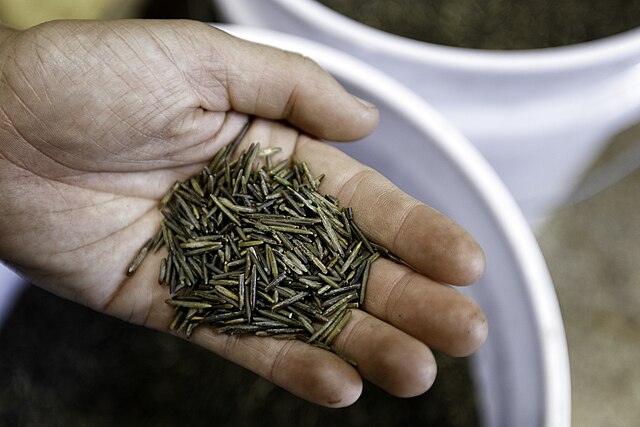Wild rice, also called manoomin, mnomen, Psíŋ, Canada rice, Indian rice, or water oats, is any of four species of grasses that form the genus Zizania, and the grain that can be harvested from them. The grain was historically and is still gathered and eaten in North America and, to a lesser extent, China, where the plant's stem is used as a vegetable.
Wild rice
A 19th century illustration of Native Americans harvesting wild rice
Ojibwa pouch for holding wild rice, cedar bark, American Museum of Natural History
Processed wild rice
Rice is a cereal grain, and in its domesticated form is the staple food for over half of the world's human population, particularly in Asia and Africa, due to the vast amount of soil that is able to grow rice. Rice is the seed of the grass species Oryza sativa or, much less commonly, O. glaberrima. Asian rice was domesticated in China some 13,500 to 8,200 years ago, while African rice was domesticated in Africa some 3,000 years ago. Rice has become commonplace in many cultures worldwide; in 2021, 787 million tons were produced, placing it fourth after sugarcane, maize, and wheat. Only some 8% of rice is traded internationally. China, India, and Indonesia are the largest consumers of rice. A substantial amount of the rice produced in developing nations is lost after harvest through factors such as poor transport and storage. Rice yields can be reduced by pests including insects, rodents, and birds, as well as by weeds, and by diseases such as rice blast. Traditional rice polycultures such as rice-duck farming, and modern integrated pest management seek to control damage from pests in a sustainable way.

Rice plant (Oryza sativa) with branched panicles containing many grains on each stem
Rice grains of different varieties at the International Rice Research Institute
Anatomy of rice flowers: spikelet (left), plant with tillers (centre), caryopsis (top right), panicle (right)
Detail of rice plant showing flowers grouped in panicle. Male anthers protrude into the air where they can disperse their pollen.








